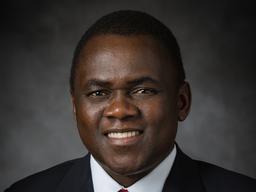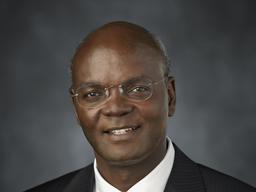With ground broken Friday for The Church of Jesus Christ of Latter-day Saints’ first temple in the Democratic Republic of the Congo, the Church now has three temples in development and another three functioning on the continent of Africa.
Mormon temple construction, no matter where it occurs, indicates not only a strong and mature Latter-day Saint community but also one that is growing. (Temples are separate from chapels, where members gather for weekly worship services.) Indeed, the Church in Africa has grown exponentially in in the past 30 years — a fact surprising even to those who understand best the culture and complexity of this vast region of the globe — whether they are leaders and converts living and serving in Africa, or those who have come to Salt Lake City to help guide the affairs of the global Church.
In 2014, more than 12,000 people joined the Church in Southeast Africa (about 4 percent of growth Churchwide) and 24,000 people joined in West Africa (about 8 percent of the 296,000 converts around the globe). And in 2015, growth merited the creation of the Church’s first two stakes (groups of congregations under the direction of an ecclesiastical leader) in Mozambique.
In 2015, the Church created 17 new stakes (each similar in size to a diocese) throughout Africa.
- Africa Growth
- Africa Growth
- Africa Growth
- Kinshasa DRC Temple
- Kinshasa DRC Temple
- Africa Growth
- Africa Growth
- Africa Growth
- Africa Growth
- Africa Growth
- Church Growth
- Elder JW Sitati
- Elder Edward Dube
| Temple Square is always beautiful in the springtime. Gardeners work to prepare the ground for General Conference. © 2012 Intellectual Reserve, Inc. All rights reserved. | 1 / 2 |
To appreciate this rapid growth, historical context helps. In Africa 30 years ago, the Church had 137 separate congregations and about 22,000 members. Today, there are more than 1,600 congregations and half a million members — that’s 11 times more wards and branches and 20 times more members than in 1985.
A Humble, Family-Focused People
So why such rapid growth? Leaders attribute it to the Church’s focus on family and the refinement of soul that comes from a humble lifestyle.

“We are a family people in Africa,” says Zimbabwe native Elder Edward Dube of the Seventy, whose current assignment is in Salt Lake City. “You would find that whatever we have, whatever little we have we share among ourselves. So when the Church talks of family, people easily identify themselves with family cultures, family values.”
Joao Castenheira, a stake president who was called to preside over congregations in Maputo, Mozambique’s capital, agrees.
“The members of Maputo look for a church that brings them happiness, and the restored gospel of Christ brings happiness to families,” he says.
Elder Joseph W. Sitati of the Seventy, who is a native of Kenya, says the meager circumstances of many Africans — a byproduct of struggling economies across the continent — has instilled in them a deeper appreciation for life’s most important things.

“These are just grateful people; they are happy people,” Elder Sitati says. “They have been humbled by their circumstances. And they look to the Lord with real intent, and when they are taught things, they embrace them.”
Eagerly Embracing and Applying Spiritual Education
The Mormon youth in Ghana have a commitment to Christ-centered faith that includes attending seminary, an educational program for youth, at 5:30 in the morning, five days a week.
“I came to seminary because I want to learn, to know more about the Lord,” said one young man.
“It’s sometimes very tedious to wake up early in the morning and come all the way from the house,” a young woman added. “But then it gets interesting when we meet each other and everybody is happy and smiling, and we are coming here to learn and we know what we are learning about, and the gospel fills us with so much joy.”
African Latter-day Saints also thrive in applying spiritual knowledge — namely, in strengthening their self-reliance and serving their fellow man.
“Because again, of their meager circumstances, they have grown up helping each other,” Elder Sitati says. “And so the call to serve is something that is welcome for most people. And you see that most people … take their [Church assignments] in very, very strongly and try to magnify them.”
And Elder Dube says he sees “most of the members are learning about self-reliance principles [and] those stricken with poverty rising up, finding their way. I see them as they participate and sacrifice. I see them moving forward, getting those basics of life and being an influence for good in the communities which they live. … You could almost say that we take good men and women and make them better as they embrace the principles of the gospel, and thereby being an influence in the community which they live in.”
The Growth Continues
The Church has temples in Ghana, South Africa and Nigeria and three more soon to follow in the Ivory Coast, the Democratic Republic of the Congo and Durban, South Africa.
What’s more, the Church will soon have a new missionary training center in Accra that can train 400 missionaries at a time to support the faith’s global missionary force. (The Church has 15 other missionary training centers around the world.)
“I'm just amazed when I look at our Savior Jesus Christ, the love which He has for all His children,” Elder Dube adds. “Yes, we spoke about our rapid growth in Africa. I really feel this is Africa's time. The Lord's hand is in the continent.”